Retro Replay Review
Gameplay
Dragon Buster’s core gameplay loop is built around classic side-scrolling action and exploration, making each playthrough a test of skill and strategy. Players guide the hero through sprawling levels divided into themed stages—caves, towers, castles—each packed with unique obstacles and monsters. The freedom to choose different paths toward the level’s final boss adds an element of replayability, as some routes are more direct but fraught with tougher enemies, while others are meandering yet potentially rewarding with secret power-ups.
Armed only with a sword and limited vitality, players must dispatch creatures ranging from skeletal warriors to fire-breathing drakes. Health is precious: there is no healing between stages, so every hit taken in earlier segments can compromise your chances in the final showdown. This design emphasizes cautious but confident play, encouraging you to learn enemy patterns and leverage stage layouts to your advantage. The careful balance between risk and reward keeps you engaged, as you decide whether to explore every nook for extra power-ups or press onward to conserve vitality.
Power-ups in Dragon Buster include temporary weapon upgrades and health restoratives hidden in breakable objects or dropped by defeated foes. These enhancements feel significant, rewarding thorough exploration. You’ll also find vertical and horizontal passageways, requiring precise jumps and timing to navigate narrow platforms. The game’s pioneering “vitality” meter—the first of its kind in action titles—measures both your remaining health and acts as a silent coach, urging you to play skillfully. Overall, the gameplay strikes a satisfying balance between challenge and fairness, laying the groundwork for many action-platformer conventions that followed.
Graphics
As an early arcade title, Dragon Buster showcases bright, bold sprite work that gleams on the coin-op cabinet. Each stage features distinct visual themes: dripping stalactites in the caves, gothic spires in the tower, and voluminous stone walls in the castle. Enemy designs are instantly recognizable—feral beasts, armored knights, flying gargoyles—each animated with enough frames to convey weight and intent, giving the world a palpable sense of danger.
The color palette, though limited by the hardware of the mid-1980s, is put to excellent use. Contrasting hues delineate platforms and background elements clearly, minimizing player confusion during fast-paced leaps. Animation frames for your hero’s sword swings and death throes are smooth and responsive, reinforcing the game’s emphasis on timing. Occasional flicker during intense on-screen action is a period-accurate quirk that modern ports often smooth out, yet part of the arcade charm remains intact in contemporary collections.
In modern re-releases on digital platforms, graphical fidelity has been preserved if not enhanced with optional scanline filters and widescreen displays. While purists may miss the original CRT glow, the crisp pixel art still holds appeal. Environmental details—such as banners waving in castle corridors or the subtle glow of torches—add depth without distracting from the main action. Dragon Buster’s visuals stand as a testament to efficient design on limited hardware, and they continue to delight retro enthusiasts and new players alike.
Story
While Dragon Buster’s narrative is straightforward, it effectively frames the hero’s quest in archetypal fantasy terms. A valiant knight sets out to vanquish a malevolent dragon terrorizing the kingdom and rescue the captive princess. Each level culminates in a boss battle that represents a significant milestone in the hero’s journey—from battling a giant golem in the tower to dueling a dragon lieutenant within the castle walls. The minimal storyline ensures that gameplay remains front and center, yet it provides just enough context to fuel your motivation.
Between levels, brief interstitial screens hint at the stakes: the dragon’s growing fury, the princess’s peril, and the people’s hope resting on your blade. Though there are no extensive cut-scenes or dialogue sequences, the combination of evocative stage names and boss designs fills in narrative gaps with imagination. Every victory feels meaningful, as if pushing the beast’s influence back one step at a time. The simplicity of the story also makes the game highly accessible—no prior knowledge is needed to jump in and start slaying monsters.
For players seeking deeper lore, various later ports and fan translations have expanded the mythos, offering character profiles and map overviews. However, the original arcade version’s lean storytelling has its own charm: it allows gamers to project themselves into the knight’s boots, turning each level into an epic trial. In this sense, Dragon Buster laid early groundwork for action games where gameplay speaks louder than cutscenes.
Overall Experience
Dragon Buster offers a robust arcade experience that balances challenge, exploration, and discovery. Its branching level design invites multiple playstyles—speedrunners can chase the quickest route to each boss, while completionists can hunt every secret room for health boosts and weapon upgrades. The absence of mid-stage healing heightens tension, making every hit count and rewarding careful, practiced play.
Difficulty is well-paced: early stages serve as a warm-up, teaching you enemy patterns and platforming basics, while later levels demand precision and quick reflexes. The boss encounters themselves are distinct and memorable, each requiring you to adapt your strategy. Whether you’re encountering the game for the first time on a modern console or reliving arcade memories, Dragon Buster remains compelling, with gameplay that feels both fair and exhilarating.
For potential buyers, Dragon Buster represents a significant piece of gaming history. Its introduction of a vitality meter and multi-stage levels influenced countless subsequent titles in the genre. While it may lack modern conveniences like save points or abundant checkpoints, these very constraints add to its nostalgic allure. If you appreciate classic action-platformers or want to experience one of the genre’s foundational titles, Dragon Buster delivers an engaging, challenging adventure that stands the test of time.
 Retro Replay Retro Replay gaming reviews, news, emulation, geek stuff and more!
Retro Replay Retro Replay gaming reviews, news, emulation, geek stuff and more!

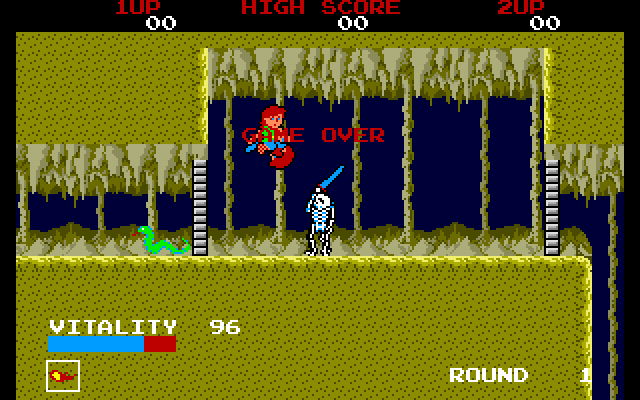
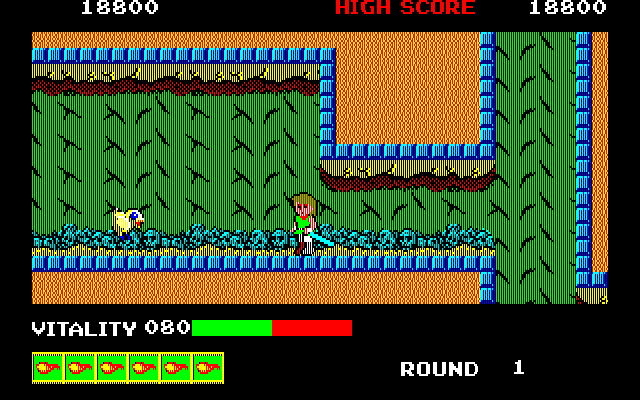
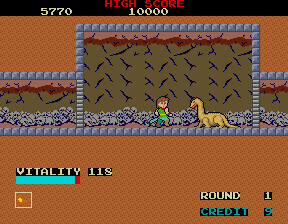
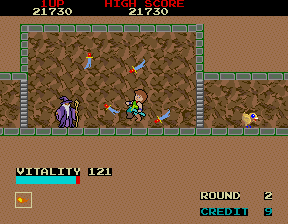
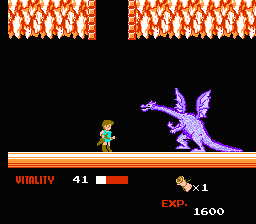



Reviews
There are no reviews yet.